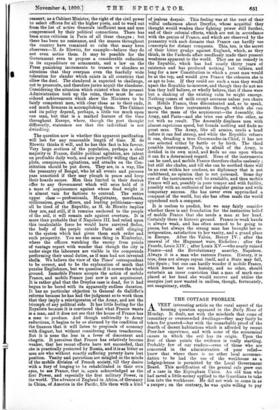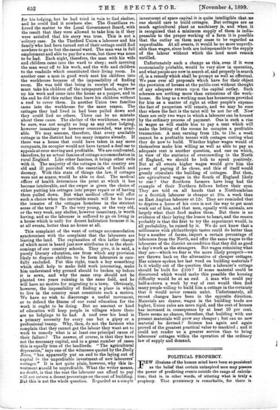THE COTTAGE PROBLEM.
AVERY interesting article on the rural aspect of the housing question appeared in the Daily News of Monday. It dealt, not with the mischiefs that come of insanitary or overcrowded dwellings—they may fairly be taken for granted—but with the remarkable proof of the dearth of decent habitations which is afforded by recent Poor-law experience, and with some of the economical causes in which the evil has its origin. Upon the first of these points the evidence is really startling. Probably few of our readers—even of those who are concerned in the administration of poor relief—, know that where there is no other local accommo- dation to be had the use of the workhouse as a lodging-house is permitted by the Local Government Board. This modification of the general rule grew out of a case in the Erpingham Union. An old man who had saved a little-money applied to the Guardians to take him into the workhouse. He did not wish to come in as a pauper ; on the contrary, he was quite willing to pay for his lodging, but he had tried in vain to find shelter, and he could find it nowhere else. The Guardians re. ferred the matter to the Local Government Board, with the result that they were allowed to take him in if they were satisfied that his story was true. This is not a • solitary case. In the Thetford Union a labourer and his family who had been turned out of their cottage could find nowhere to go to but the casual ward. The man was in full employment and able to pay for a room, but there was none to be had. Each night, therefore, the man with his wife and children came into the ward to sleep; each morning the man went off to his work, and the wife and children to the roadside which constituted their living room. In another case a man in good work sent his children into the workhouse because of the impossibility of finding room. He was told that being in receipt of wages he must take his children off the ratepayers' hands, or throw up his work and come into the house as a pauper, and in the end he did this rather than leave his children without a roof to cover them. In another Union two families came into the workhouse for the same reason. The cottages they had lived in had been pulled down and they could find no others. There can be no mistake about these cases. The shelter of the workhouse, we may be sure, was not sought so long as any other lodging, however insanitary or however overcrowded, was avail- able. We may assume, therefore, that every available cottage in the district had too many inmates already. If there was a house that could have taken in any more occupants, its occupier would not have turned a deaf ear to appeals at once moving and profitable. We are confronted, therefore, by an actual famine of cottage accommodation in rural England. Like other famines, it brings other evils with it. The majority of the cottages in the country are old and ill provided with the essentials of health and decency. With this state of things the law, if cottages were not so scarce, would be able to deal. The medical officer of health determines the point at which it has become intolerable, and the owner is given the choice of either putting his cottages into proper repair or of having them pulled down. But what medical officer will offer such a choice when the inevitable result will be to leave the inmates of the cottages homeless in the strictest sense of the term ? To the very young, or the very old, or the very weak, any shelter, however insanitary, is worth having, and so the labourer is suffered to go on living in a house which is unfit for decent habitation because it is, at all events, better than no house at all.
This complaint of the want of cottage accommodation synchronises with the complaint that the labourers are leaving the land. The explanation of this latter change of which most is heard just now attributes it to the short- comings of our country schools. They give, it is said, a purely literary education, one from which any provision likely to dispose children to be farm labourers is care- fully excluded. Put this right, teach a boy something which shall help to make field work interesting, make him understand why ground should be broken up before it is sown, and why the same crop should not be planted two years running in the same field, and he will have no motive for migrating to a town. Obviously, however, the impossibility of finding a place in which to live in the country must constitute such a motive. We have no wish to discourage a useful movement, or to defend the fitness of our rural education for the work it ought to be doing. But no amount or kind of education will keep people in villages where there are no lodgings to be had. A roof over his head is a primary necessity for every one but a gipsy or a professional tramp. Why, then, do not the farmers who complain that they cannot get the labour they want set to work to remedy what is at least one principal cause of their failure ? The answer, of course, is that they have not the necessary capital, and in a great number of cases this is equally true of the landlords. " The agricultural depression," says one of the witnesses quoted by the Daily News, " has apparently put an end to the laying out of capital in the unprofitable investment of new labourers' cottages." It is not quite plain, however, why this in- vestment would be unprofitable. What the writer means, no doubt, is that the rent the labourer can afford to pay w ill not return a decent percentage on the cost ot Bat this is not the whole question. Regarded as a simple investment of spare capital it is quite intelligible that no one should care to build cottages. But cottages are as much agricultural plant as machinery is, and when it is recognised that a minimum supply of them is indis- pensable to the proper working of a farm it is possible that the outlay on them may cease to be regarded as unprofitable. At all events, it would be no more unprofit- able than wages, since both are indispensable to the supply of the labour without which the land must remain untilled.
Unfortunately such a change as this, even if it were economically probable, would be very slow in operation, and what people are now in search of, and properly in search of, is a remedy which shall be prompt as well as effectual. We pass over all proposals which have for their object the provision of houses at the public cost without thought of any adequate return upon the capital outlay. Such schemes are nothing more than extensions of the work- house. So long as a working man has houseroom provided for him as a matter of right at other people's expense the fact of pauperism will remain, and we may be sure that where the fact is the taint will be not far off. Now• there are only two ways in which a labourer can be housed by the ordinary process of payment. One is such a rise in wages as will enable him to pay a rent which will make the letting of the rooms he occupies a profitable transaction. A man earning from 12s. to 15s. a week cannot be a profitable tenant with cottages costing what they do now to build. Whether higher wages would of themselves make him willing as well as able to pay an adequate rent is another question, and one on which, in view of the statistics of overcrowding in the North of England, we should be loth to speak positively. But at all events higher wages would give him the power of paying if he chose, and this of itself would greatly stimulate the building of cottages. But then, are agricultural wages in the South of England likely to rise ? Our Southern farmers have long had the example of their Northern fellows before their eyes. They are told on all hands that a Northumbrian or a Scottish labourer is cheaper at 20s. a week than an East Anglian labourer at 12s. They are reminded that to deprive a horse of his corn is not the way to get most work out of him, and that men, equally with animals, are largely what their food makes them. But there is no evidence of their laying the lesson to heart, and the reason probably is that the first to try the experiment would, in all probability, be ruined by it. We do not know that a millionaire with philanthropic tastes could do better than buy a number of farms, import a certain percentage of labourers from the North, and offer the same wages to the labourers of the district on condition that they did as good a day's work as the strangers. But wages remaining what they are—which we fear is the more likely prospect—we are thrown back on the alternative of cheaper cottages. Has science spoken her last word on building materials ? Is it wholly out of the question that a labourer's cottage should be built for £100 ? If some material could be discovered which would make this possible the housing difficulty would be at an end. A man who could pay half-a-crown a week by way of rent would then find many people willing to build him a cottage in the certainty that it would never remain unlet. Unfortunately, all recent changes have been in the opposite direction. Materials are dearer, wages in the building trade are higher, Union rules are more rigid, and the cost of houses has increased in consequence by at least 30 per cent. There seems no chance, therefore, that building with our present materials will grow any cheaper ; but can no new material be devised ? Science has again and again proved of the greatest practical value to mankind ; and it could not render us a greater service than to bring labourers' cottages within the operation of the ordinary law of supply and demand.























































 Previous page
Previous page